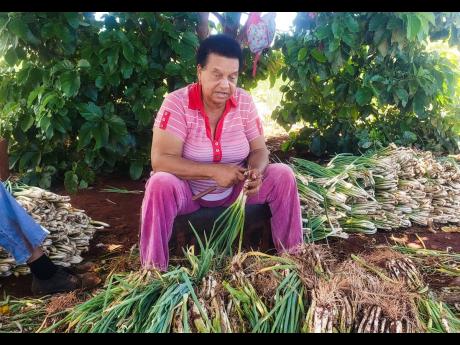Climate change not a factor, says St Elizabeth farmer
Consistent rainfall over at least three days had put a damper on things in Flagaman, Southfield and other neighbouring communities in St Elizabeth when The Gleaner visited recently, but farmer Dawn Ebanks insisted that this was just the usual October rains and nothing exceptional.
On the question of how climate change was affecting her vocation, the veteran farmer said she had seen no evidence of it in her community. However, she said that farmers have been hard hit by ongoing price increases in farming inputs and lack of marketing, and so had a lot to complain about.
One farmer, who refused to give his name, insisted that the absence of a proper marketing strategy was the main issue hurting farming in the area. He pointed out that the farmers’ market concept which was unveiled during Minister of Health and Wellness Dr Christopher Tufton’s tenure as agriculture minister in 2011 was the best thing to happen for them.
He explained that in taking the customers to the farmers in a specific location on a given day, there was no place for the middleman, and so even if they sold at a little higher price, the housewife would still benefit from a lower price.
“Bring back the farmers’ market,” he urged.
The recent expose on a farmer whose entire melon crop was spoilt, with the fruit being soft and slushy when cut, meant the demise of all other melon farmers, even those who were not so affected. Ebanks, who harvested three bumper melon crops, was among those who suffered significant losses, even though she did not have one bad melon among them.
“RADA (Rural Agricultural Development Authority) come by, about six or seven a them, and them say the melon is sweet, it good, nutten nuh wrong with it, but when the rumour go out that it not good, don’t care what you do, nobody naw come buy,” she disclosed.
In fact, based on what he heard via the media, one of her customers returned a batch of melons, without even cutting open one. This Ebanks found to be particularly galling and the issue sparked a number of running jokes among the farmers who used wheelbarrows to truck the abundance of melons to their pigs.
“We lucky the hog never talk and seh, ‘melon again?’ Because I had a lot,” she shared.
Having paid workers to plant, fertilise, weed, water and spray the melons, Ebanks, who lives in Flagaman but was supervising the cleaning of scallion for a client, lamented the fact that despite the visit by the RADA team, she has heard nothing from the government extension service since.
“Not a single man never step in and help we. Nobody step in and say bwoy, see two bag a fertiliser here fi help you go back. Nutten! I never get nuh help.”
The ongoing price increases for farming inputs is another burden the farmers are facing and for which Ebanks expressed disappointment with her Prime Minister Andrew Holness.
“The spray dem expensive, the fertiliser expensive, everything expensive. Me did a look fi likkle better from Andrew because a my prime minister. I naw lie, a love him to death, but me a tell you the truth, him fi do better fi the farmers because this parish is the breadbasket.
“I just come from the farm store a while ago and the amount you pay fi the price of a bag of fertiliser and you don’t bound fi get the crop. Them fi think, man, the farmers cannot manage the fertiliser, the spray gone up, everything inna the farm store gone up and then when the crops come in, if more than two persons have it, the price drop. So you get little and nothing for it, so it need fi change, man.”
Ebanks lives in Flagaman but The Gleaner caught up with her on a property in nearby Little Park which has an irrigated water system in place, which she had leased. With no irrigation water available on her property near to the home, she has opted to grow grass on the land which is harvested for use as mulch.
A lot of the land we saw under cultivation, as well as being prepared for planting, was rocky, with very little soil coverage, which Ebanks explained was where a knowledge of which crops and even what variety of the same crop to plant can make the difference between profit and loss.
On the specific issue of the impact of climate change on farming in the area, Ebanks said: “Well it don’t affect me. I don’t know fi anybody else because my yielding is still good.”

